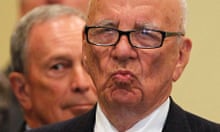The acting editor of the Sunday Times has apologised unreservedly to Jewish community leaders for what he said was "a terrible mistake" in publishing a cartoon featuring Israeli prime minister Benjamin Netanyahu, which prompted a wave of complaints of antisemitism.
In a statement issued after a Tuesday afternoon meeting with representatives of the UK Jewish community, Martin Ivens said that cartoonist Gerald Scarfe, although renowned for being "consistently brutal and bloody" in his work, had "crossed a line" with the illustration published in the Sunday Times on Holocaust Memorial Day.
Ivens said the Sunday Times "abhors antisemitism and would never set out to cause offence to the Jewish people". He admitted the timing of the cartoon, which depicted Netanyahu building a bloody wall entrapping the bodies of Palestinians, "was inexcusable".
Echoing an apology already issued by Rupert Murdoch who had described the cartoon as "grotesque", Ivens added: "The associations [with antisemitism] on this occasion were grotesque and on behalf of the paper I'd like to apologise unreservedly for the offence we clearly caused. This was a terrible mistake."
The apology amounts to a dramatic about turn for the paper, which on Sunday night defended the controversial illustration, saying it was "a typically robust cartoon by Gerald Scarfe" which was "aimed squarely at Mr Netanyahu and his policies, not at Israel, let alone at Jewish people".
The apology came after a turbulent 48 hours for Ivens, who is barely a week into his new job at the helm of the paper and went home after on Monday night knowing that his proprietor, Rupert Murdoch, had taken to Twitter to brand Scarfe's work "grotesque" and "offensive" and call for "a major apology".
Mik Moore , a strategic communications consultant in New York who campaigned to get the controversial presenter Glenn Beck taken off Murdoch's Fox News because of references to the Holocaust, said he was not surprised that Murdoch rushed in to apologise.
"He has close relationships with Jewish leaders in the US and I know he has had questions about antisemitism before on Fox News," Moore told the Guardian. "It's something I believe he is very sensitive to."
Ivens's apology was issued after a meeting with Jewish community organisations including the Board of the Deputies of British Jews, which had complained to the Press Complaints Commission on Sunday, describing the cartoon as "appalling" and "all the more disgusting" for being published on Holocaust Memorial Day, "given the similar tropes levelled against Jews by the Nazis".
The organisation said the depiction of a Jewish leader using blood for mortar "is shockingly reminiscent of the blood libel imagery more usually found in parts of the virulently antisemitic Arab press".
Mick Davis, chair of the Jewish Leadership Council, said after the meeting with Ivens that it welcomed the "genuine apology". He added: "I appreciate the urgency and respect with which the Sunday Times have treated Jewish communal concerns and now look forward to constructively moving on from this affair."
Initially the Sunday Times tried to hold the line on its defence of the Scarfe cartoon, but by Monday the row had escalated with the Israeli ambassador to the UK, Daniel Taub, condemning the paper. "The image of Israel's security barrier, which is saving the lives of both Jews and Arabs from suicide bombers, being built from Palestinian blood and bodies is baseless and outrageous," Taub said.
The Sunday Times responded with a second, more conciliatory statement on Monday with Ivens saying "the last thing" he or "anyone connected with the Sunday Times would countenance would be insulting the memory of the Shoah or invoking the blood libel".
However, that line was breached decisively on Monday night when Murdoch tweeted: "Gerald Scarfe has never reflected the opinions of the Sunday Times. Nevertheless, we owe major apology for grotesque, offensive cartoon."
Scarfe issued his own statement on Tuesday saying that the Sunday Times had given him the freedom to criticise world leaders over the last 46 years and that this cartoon was "a criticism of Netanyahu, and not of the Jewish people". He said "no slight whatsoever was intended" but that he was "stupidly completely unaware" it was being published on Holocaust Memorial Day. "First of all I am not, and never have been, antisemitic," he said.
Although the Sunday Times came in for widespread criticism, some Jewish commentators complained that the row over Scarfe's cartoon was hysterical and imbalanced.
Anshel Pfeffer, columnist with the Israeli newspaper, Ha'aretz, said it was a case of the "usual suspects" weighing in to "clamouring for venerable cartoonist Scarfe's head", in a column published on Tuesday. He told the Guardian: "The fight against anti-semitism is too important for any effort to be squandered on the wrong targets and in every case that I have known, the struggle against racism and xenophobia goes together with the cause of the freedom of the press."
In London, Rachel Lasserson, editor of the Jewish Quarterly, also expressed concern. "There is real antisemitism in places like Hungary and Italy that is really scary. We really need to be able to distinguish between general antisemitism and a discussion about the settlements and the West Bank barrier."
Lasserson's deputy Joseph Finlay said he was more concerned by people like Silvio Berlusconi, who used Holocaust Day to praise Italy's fascist dictator Benito Mussolini, than a cartoonist like Scarfe who was operating within the realms of reasonable free speech.
Scarfe, whose career with the Sunday Times stretches back to the 1960s, has never shied away from controversy. He often makes use of images of blood in his cartoons. Blood is splashed across his website and featured, for example, in a recent cartoon of the Syrian leader Bashar al-Assad, who was pictured as a green, wraith-like creature drinking greedily from an oversized cup labelled "children's blood".
To contact the MediaGuardian news desk email editor@mediatheguardian.com or phone 020 3353 3857. For all other inquiries please call the main Guardian switchboard on 020 3353 2000. If you are writing a comment for publication, please mark clearly "for publication".






